
Torn rotator cuffs are a frequently encountered problem identified in my office on a daily basis. Sadly, far too many patients are under the assumption that because something is torn, it must, therefore, be fixed. Luckily, many of you with torn rotator cuffs will not require surgery. Let’s dive a little deeper in the shoulder and the subject of rotator cuff tears.
The rotator cuff is four small muscles which control our shoulder stability and motion. These are small muscles which are easily overcome by repetitive stress, age-related degeneration or a traumatic injury. In order to guide you further, let’s answer the following questions.
Torn Rotator Cuffs Questions
- Why are torn rotator cuffs so common?
- What caused my torn rotator cuff?
- Do all torn rotator cuffs require surgery?
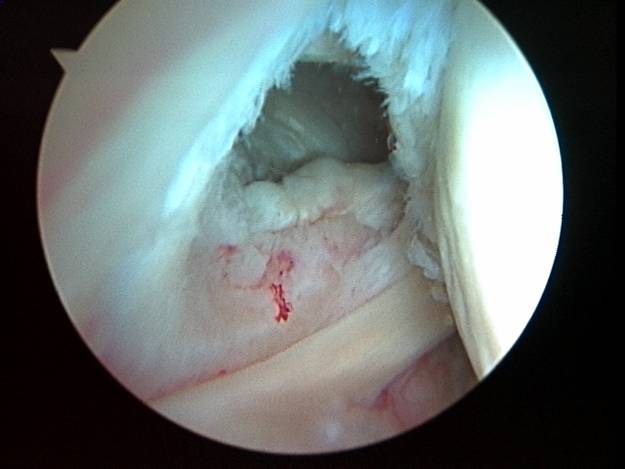
The rotator cuff is composed of tendon tissue. A tendon is a structure which connects a muscle to the bone. In the pictures to the right, the rotator cuff is the white tissue you see attaching to the ball which is the top of the arm bone.
Most of our tendons are very thick and very strong. They also have a very firm grasp of the bone they are attached to. Our bodies are very “smart”. The more we use a tendon, the stronger and thicker it gets. Similarly, the less we use it, the weaker it becomes.
Most torn rotator cuffs are not caused by an injury such as a fall. Some torn rotator cuffs are caused by trauma, and I’ll discuss that later. The vast majority of rotator cuff tears involve the tendon of the supraspinatus muscle. Because of how the shoulder works, the supraspinatus is subject to very little stress… therefore the tendon can become thin; its attachment becomes weak, and eventually, a hole develops. Many torn rotator cuffs have a degenerative origin, much like the front of your knee on your favorite pair of blue jeans. This hole is unfortunately called a tear — and many of you believe you have actually torn your rotator cuff. We refer to these common tears as “degenerative rotator cuff tears”. That implies that the tendon simply wore out.
Does all Torn Rotator Cuffs Need Surgery?
There is a lot of recent literature or scientific evidence that many torn rotator cuffs do not become larger and the majority of torn rotator cuffs will not require surgery. Contrary to the studies I just mentioned, there is literature showing that the number of torn cuffs being treated surgically has also risen dramatically. The authors speculate that our fee-for-service reimbursement system is to blame.
The majority of people with a degenerative and torn rotator cuffs can be managed quite effectively with physical therapy, injections, rest from certain overhead activities for a while and patient observation. We do recommend an annual visit to your doctor so they can assess your level of function, pain and perhaps image your rotator cuff with an Ultrasound or MRI to look to see if the tear has become larger. In patients who fail to improve with non-surgical measures, or in patients whose tear becomes much larger, then rotator cuff surgery is indicated.
I mentioned before that most torn rotator cuffs occur due to the fact that our tissues simply wears out. Another (far less common) source of a tear in your rotator cuff is trauma or an injury. Torn rotator cuffs generally require a significant injury to cause a tear. Most shoulder docs would agree. In patients with acute (recent), traumatic tears, surgery is generally indicated to repair the tear and sew it back to the bone it was torn from. PRP or Stem cells for the treatment of torn rotator cuffs is controversial at present… and is the subject of significant investigation.
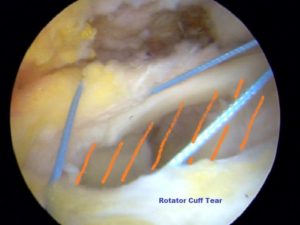
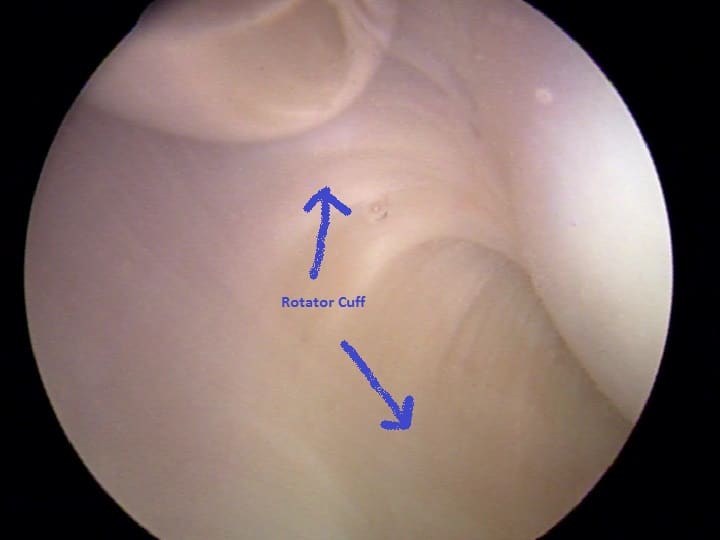
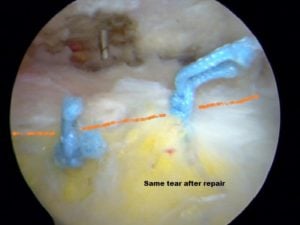


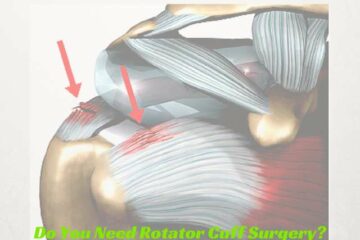


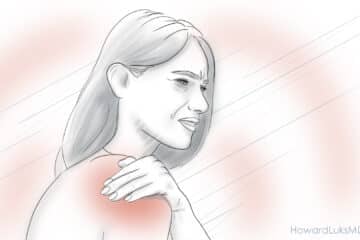





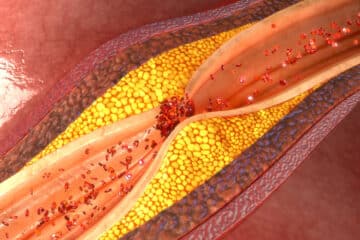
Hey there Dr Luks,
I’m 22 and woke up this morning with an excruciating pain in my right shoulder. When I was about 17 I was throwing a ball and felt a burning sensation run down my arm. After that I was unable to throw a ball without feeling pain for almost a year. Slowly it got better. Off and and on since then I would feel a twang of pain here or there. Wouldn’t really be able to do push-ups without feeling a dull pain start to build. But for the most part very functional. I never loss any range of motion or felt any clicking or popping. Anyhow. Yesterday I started jogging again. Ran a couple of miles. Came home felt fine. Went to bed and this morning I woke up a lot earlier because I couldn’t sleep. Shoulder pain was at least an 8/10. It hurts mainly when it’s not being used. I make a throwing motion and it hurts little to none. But resting on my side it just burns. I’m in relatively good shape. Pretty thick guy. I weigh 245 and am 6′. Very muscular. Any ideas or thoughts would be appreciated. Thanks.
I am a boxer aged 20 and since my last sparring session, I’ve felt some clicking in my right shoulder and it pains ever so slightly when I lift my arm. Its been a week nearly and today I also noticed that if I do bicep curls (without weights), my elbow clicks too, though there is no pain there yet. Could this be a problem on the horizon? Please advise..
unlikely Travis… but if it persists an Xray might be beneficial
Hi i recently hurt my shoulder snowboarding and have noticed that my shoulder clicks and pops when i raise it as if i was going to throw a ball. I went to play tennis and i noticed i couldn’t serve as there was a lot of pain. Do you think I’ve damaged my rotator cuff?
Many possibilities… a strain with inflammation, labral tear, rotator cuff injury, etc… A physical examination will help guide your treatment.
Hi – I’m 60 years old and I am pretty good shape. Crossfit and weightlifting for 3+ years now. I mount and balance race tires for a living. Just this past weekend I bent over and was pulling up on a tire extremely hard, I felt/heard a pop and then a burning sensation in my right shoulder (anterior deltoid). Now if I externally rotate my shoulder while I’m bent over and pull at the same time I will get the popping and burn. It actually makes me lose all my strength for a few seconds. I can lift objects above my waist as long as I keep my shoulder rigid and not externally rotate by forearm/bicep. I also have no problem pushing objects above my waist or above my head. Help!
Sorry Phil :-( You have likely strained or torn your rotator cuff or biceps. If your pain doesn’t improve slowly over the next few weeks I would see a shoulder doc for a solid exam and discussion.
Hi- I’m 28 years old and in good physical shape. Last week I went surfing for about 2 hours, then I drove home. On the way home my arms and shoulders felt really tired, but I went and played tennis that afternoon for about 2 hours anyways. By the time I finished playing tennis my right shoulder (the one I serve with in tennis) was really hurting. Now days later it is still hurting and I cant really sleep on it. Should I get it checked out or just rest it for a few more days? Thanks in advance for any help.
I would see your primary care doc or an orthopedist.